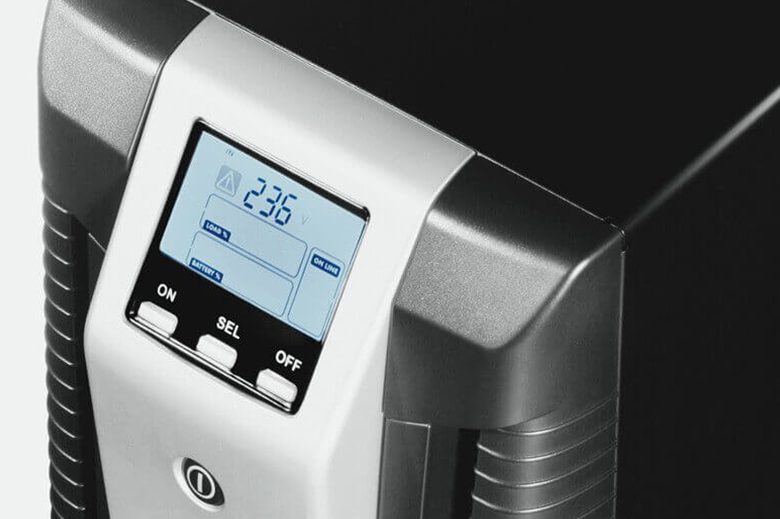News
How to Extend the Life of Your UPS
As winter draws closer, the risk of power outages increases, especially as cold weather and extreme conditions strain power grids. Data from organisations like Climate Central shows that weather-related power outages are on the rise, making it more critical than ever for businesses to have a robust power protection strategy. This is why preventative maintenance on your Uninterruptible Power Supply (UPS) is non-negotiable.
For businesses, this means one thing: the need for reliable power protection. Uninterruptible Power Supply (UPS) systems are a critical part of that protection, ensuring operations continue smoothly, even during power interruptions. But just like any other piece of equipment, UPS systems require regular maintenance to ensure they perform at their best when needed most.

In this article, we'll explore how to extend the life of your UPS system with some preventative maintenance tasks. By taking a few simple steps before the cold weather arrives, you can avoid costly downtime and ensure that your business is always ready, no matter the weather.
1. Check and Test Your UPS Batteries
UPS batteries are the core of your power protection system, and during power failures they keep your business running for as long as possible. Over time, however, batteries degrade and lose their ability to hold a charge, reducing their backup power capacity.
The National Energy System Operator's (NESO) latest outlook suggests that while the grid is prepared for winter, there may still be 'tight particularly in early December or mid-January when power supply is under the most stress. This makes a reliable battery even more crucial during these specific periods.
How can I test UPS batteries?
- Battery Discharge Test: Run a battery discharge test to verify that the battery can handle the required load. This will help you determine how much backup power the system can provide in the event of an outage.
- Check Battery Voltage: Ensure the battery voltage is within the recommended range. Low voltage readings may indicate that the battery is no longer capable of providing reliable power.
- Battery Age: UPS batteries typically last 3-5 years. If your batteries are approaching this age or failing the discharge test, it's time for a replacement. If you're unsure of their age, check the production date or consult the manufacturer’s guidelines.
2. Inspect and Clean the UPS Cooling System
UPS systems generate heat during normal operations, especially when running for extended periods. If the UPS system overheats, it could lead to system failure or decreased efficiency, especially during the winter months when indoor heating systems often raise the temperature of your working environment.
How to clean your cooling system:
- Clean the Fans and Vents: Dust and debris can accumulate inside the UPS unit and obstruct airflow, leading to overheating. Regularly clean the fans and vents to ensure proper airflow and efficient cooling.
- Check the Cooling Fans: Ensure that the cooling fans are operating correctly and are not clogged with dust. If the fans are noisy or malfunctioning, they may need to be replaced.
- ·Airflow Obstructions: Ensure that the UPS is placed in an area with adequate ventilation. Avoid placing the unit in confined spaces where airflow may be restricted.
3. Monitor Environmental Conditions
The performance of your UPS system is heavily influenced by the environment in which it operates. High temperatures and humidity levels can cause internal components to degrade faster, potentially shortening the life of the unit.
How to monitor your environment:
- Temperature Control: UPS systems perform best when they are kept in a cool and consistent temperature environment. If the room temperature is too high, it could affect the UPS’s efficiency and increase the risk of overheating.
- Humidity Levels: Excessive humidity can cause rust and corrosion on internal components. If your UPS is in a particularly humid area, consider using a dehumidifier or moving the unit to a more controlled environment.
4. Test Your UPS Under Load
UPS systems are designed to protect against power interruptions, but they must be able to handle your business's power load effectively. A simple load test can give you peace of mind that the system will work as expected in a power failure.
How to perform a load test:
- Simulate an Outage: Use a load-testing device to simulate a power outage. This will give you an idea of how long the UPS can run your equipment and whether it can handle your business’s critical systems.
- Check Runtime: During the load test, check how long the UPS runs before the battery runs out. If it’s not running for the expected amount of time, this may indicate that the battery is ageing or the system is underpowered for your needs.
5. Review Your Maintenance History and Schedule Professional Servicing
To keep your UPS system running smoothly, it's important to keep track of maintenance history and address any potential issues before they become critical problems. Having a comprehensive service log is also essential when dealing with warranties or extended support.
How to review your maintenance history:
- Service Logs: Keep detailed records of any previous maintenance or repairs. This will help you identify recurring issues and know when specific parts were last replaced.
- Professional Inspection: Schedule regular service checks with a qualified technician to inspect the UPS thoroughly, check for faults and ensure everything is functioning correctly.
6. Prepare for Winter with a Clear Emergency Response Plan
Despite all your best efforts with preventative maintenance, power outages can still happen. That’s why it’s critical to have an emergency response plan in place so your team knows what to do if the UPS fails or a power outage occurs during the winter months.
How to prepare for winter:
- Emergency Procedures: Ensure your team is trained on how to respond to a UPS failure, including shutting down systems safely, switching to backup power and contacting technical support.
- Communication Plans: Set up clear communication channels with customers and employees to keep them informed of any service interruptions or delays. For more general advice on preparing for power cuts, you can refer to the National Grid's power cut advice or the British Red Cross's guide to preparing for emergencies.
Don’t Let the Winter Interrupt Your Power
Don’t wait for an unexpected power outage to disrupt your business. Contact Adept Power Solutions today for expert UPS maintenance, UPS battery solutions and system upgrades. Our team of professionals is here to help you prepare your UPS for winter and beyond, ensuring uninterrupted power when you need it most.
Get in touch to schedule a preventative maintenance check or for more information on how we can support your power protection needs.

